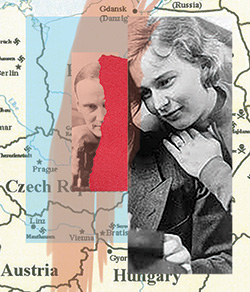Being Jewish
Commentary
Go the Distance You Can

A king quarrels with his son, according to a Hasidic parable, and in a fit of rage exiles him from the kingdom.
After a number of years, the king’s heart softens and he sends his ministers to find his son and ask him to come home. But the young man resists the invitation: He feels too bitter and hurt to return. When the ministers present the sad news to the king, he sends them out again with a new message for his son: “Return as far as you can, and I will come the rest of the way to meet you.”
For me, the parable promises that, once we have reached out as far as we can, God will be there to meet us. But it also suggests that, whether the relationship is between an individual and God or two individuals, the process of forgiveness involves both the one who was angered and the one who gave offense. What happens, then, when only one side is left to both forgive and be forgiven?
I deeply loved my father, a charming, melancholy Viennese man who fled Nazi Austria in 1938 but had neither reconciled to being stripped of his homeland nor accepted his adopted country. Struggling to find my own American way amid my father’s demanding European standards, disappointment and bouts of rage, I escaped by marrying early.
My husband and I, both hopeful young writers, used our wedding money to hone our craft during a carefree year of foreign travel. But I was severely ill when we returned from Morocco—and without health insurance. When my husband emptied our account to pay the hospital bill and prematurely checked me out, my father furiously declared that he wanted nothing more to do with me. Six months later, having kept his vow, he was slain by a heart attack.
For years, my father’s banishment—now stretching into infinity—buried me in secret shame, as if his eternal silence was proof of deep flaws in my character. When I spoke about him, I could hear the hurt inside me.
Therapy slowly enabled me to pare down my crime to youthful negligence. Wanting adventure on a shoestring, I had sacrificed conventional protections. While his banishment no longer seemed earned or just, I still couldn’t quite forgive myself.
In my fifties, wanting more peaceable feelings toward my long-dead father, I spent several substantial stays in Vienna. There I glimpsed the rich authoritarian culture that had both nourished him and cruelly mocked his love of homeland with its ruthless assault on Jews. The trauma of his forced flight and the ongoing alienation of his exile became palpable for me. Though I still resented his rages, my turmoil had been eased.
A few years ago, I was inspired to write a novel about the slow reconciliation between an old European refugee and his estranged adult daughter. Though the characters weren’t exactly like either my father or me, in writing the novel I discovered moments of great love between father and daughter and was able to give myself the forgiveness I had yearned for.
These days, thoughts of my father come to me sad, sweet and sometimes with humor. But what a long and lonely journey it has been. So much pain could have been prevented had my father and I managed to talk before his sudden death.
Too many families are torn apart by children and parents, siblings or cousins who won’t speak to each other. As Jews, we are blessed by the Days of Awe, which bring an urgency to settle misunderstandings with those we love—before they are no longer with us. In preparation for the upcoming High Holidays, may you travel as far as you can toward those you have hurt, or who have hurt you, and may your loved ones come forward to meet you.
Carol Ascher’s novel, A Call from Spooner Street (Mill City Press), will be published in October. Her website is www.carolascher.net.










 Facebook
Facebook Instagram
Instagram Twitter
Twitter
Leave a Reply